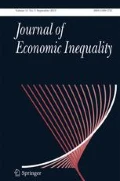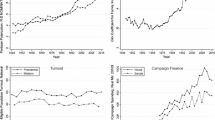Abstract
Multivariate indices of polarization are constructed to measure effects of non-income attributes like wealth and education. Polarization is considered as the presence of groups which are internally homogeneous, externally heterogeneous, and of similar size. We propose a class of polarization indices which is built from measures of relative groups size and from decomposable indices of socio-economic inequality. For the latter, we employ the special inequality indices of Maasoumi (Econometrica 54:991–997, 1986), Tsui (J Econ Theory 67:251–265, 1995; Soc Choice Welf 16:145–157, 1999) and Koshevoy and Mosler (J Multivar Anal 60:252–276, 1997). Then, postulates for multidimensional polarization measurement are stated and discussed. The approach is illustrated by an empirical application to the population of the East and West Germany with polarization defined on income and education.
Similar content being viewed by others
References
Atkinson, A., Bourguignon, F.: The comparison of multidimensional distributions of economic status. Rev. Econ. Stud. 49, 183–201 (1982)
Bhattacharya, N., Mahalanobis, B: Regional disparities in household consumption in India. J. Am. Stat. Assoc. 62, 143–161 (1967)
Blackorby, C., Donaldson, D., Auersperg, M.: A new procedure for the measurement of inequality within and among population subgroups. Can. J. Econ. 14, 665–685 (1981)
Bourguignon, F., Chakravarty, S.R.: The measurement of multidimensional poverty. J. Econ. Inequality 1, 25–49 (2003)
Chakravarty, S.R., Majumder, A.: Inequality, polarization and welfare: theory and applications. Aust. Econ. Pap. 40, 1–13 (2001)
Chakravarty, S.R., Weymark, J.A.: Axiomatizations of the entropy numbers equivalent index of industrial concentration. In: Eichhorn, W. (ed.) Measurement in economics, pp. 437–484. Kluwer, London (1988)
D´Ambrosio, C.: Household characteristics and the distribution of income in Italy: an application of a social distance measures. Rev. Income Wealth 47, 43–64 (2001)
Davis, J., Huston, J.: The shrinking middle-income class: a multivariate analysis. East. Econ. J. 18, 277–285 (1992)
Donaldson, D., Weymark, J.: A single-parameter generalization of the Gini indices of inequality. J. Econ. Theory 22, 67–86 (1980)
Duclos, J., Esteban, J., Ray, D.: Polarization: concepts, measurement, estimation. Econometrica 72, 1737–1772 (2004)
Esteban, J., Gradín, C., Ray, D.: An extension of a measure of polarization, with an application to the income distribution of five OECD countries. J. Econ. Inequality 5, 1–19 (2007)
Esteban, J., Ray, D.: On the measurement of polarization. Econometrica 62, 819–851 (1994)
Gradín, C.: Polarization by sub-populations in Spain, 1973–91. Rev. Income Wealth 46, 457–474 (2000)
Kolm, S.: Multidimensional egalitarianisms. Q. J. Econ. 91, 1–13 (1977)
Koshevoy, G., Mosler, K.: Multivariate Gini indices. J. Multivar. Anal. 60, 252–276 (1997)
Lasso de la Vega, M.C., Urrutia, A.M.: A new factorial decomposition for the Atkinson measure. Econ. Bull. 4, 1–12 (2003)
Maasoumi, E.: The measurement and decomposition of multidimensional inequality. Econometrica 54, 991–997 (1986)
Maasoumi, E., Nickelsburg, G.: Multivariate measures of well-being and an analysis of inequality in the Michigan data. J. Bus. Econ. Stat. 6, 327–334 (1988)
Marshall, A., Olkin, I.: Inequalities: Theory of Majorization and its Applications. Academic, New York (1979)
Milanovic, B.: A New Polarization Measure and Some Applications. Mimeo, Development Research Group, World Bank (2000)
Mosler, K.: Majorization in economic disparity measures. Linear Algebra Appl. 199, 91–114 (1994)
Rodríguez, J.G., Salas, R.: Extended bi-polarization and inequality measures. Res. Econ. Inequal. 9, 69–83 (2003)
Tsui, K.: Multidimensional generalizations of the relative and absolute inequality indices: the Atkinson-Kolm-Sen approach. J. Econ. Theory 67, 251–265 (1995)
Tsui, K.: Multidimensional inequality and multidimensional generalized entropy measures: an axiomatic derivation. Soc. Choice Welf. 16, 145–157 (1999)
Wang, Y., Tsui, K.: Polarization orderings and new classes of polarization indices. J. Public Econ. Theory 2, 349–363 (2000)
Wolfson, M.C.: When inequalities diverge. Am. Econ. Rev. 48, 353–358 (1994)
Wolfson, M.C.: Divergent inequalities: theory and empirical results. Rev. Income Wealth 43, 401–421 (1997)
Zhang, X., Kanbur, R.: What difference do polarisation measures make? An application to China. J. Dev. Stud. 37, 85–98 (2001)
Author information
Authors and Affiliations
Corresponding author
Rights and permissions
About this article
Cite this article
Gigliarano, C., Mosler, K. Constructing indices of multivariate polarization. J Econ Inequal 7, 435–460 (2009). https://doi.org/10.1007/s10888-008-9096-x
Received:
Accepted:
Published:
Issue Date:
DOI: https://doi.org/10.1007/s10888-008-9096-x
Keywords
- Polarization index
- Decomposable inequality indices
- Multidimensional inequality
- Multivariate social evaluation




